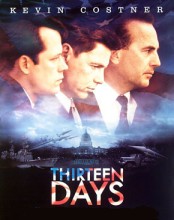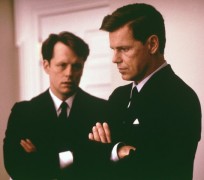| Thirteen Days |
| |
 |
USA, 2000. Rated PG-13. 145 minutes.
Cast: Kevin Costner, Bruce Greenwood,
Steven Culp, Dylan Baker, Henry Strozier, Kevin Conway, Michael Fairman,
Charles Esten, Bill Smitrovich
Writers: David Self, based on The Kennedy Tapes–Inside the White
House During the Cuban Missile Crisis by Ernest R. May and Philip
D. Zelikow
Music: Trevor Jones
Cinematographers: Roger Deakins, Andrzej Bartkowiak, Christopher
Duddy
Producers: Marc Abraham, Peter O. Almond, Armyan Bernstein, Kevin
O'Donnell
Director: Roger Donaldson
LINKS
|
 movie
like Thirteen Days, the story of the Cuban Missile Crisis of October
1962, raises several questions. Is this, a Hollywood interpretation of one of
the most significant episodes of the post-World War Two era, factually accurate?
Well, not exactly. Does Costner polish the tarnish off his stardom? No, not
exactly. Is Costner's Boston accent even remotely believable? Uh, not exactly.
movie
like Thirteen Days, the story of the Cuban Missile Crisis of October
1962, raises several questions. Is this, a Hollywood interpretation of one of
the most significant episodes of the post-World War Two era, factually accurate?
Well, not exactly. Does Costner polish the tarnish off his stardom? No, not
exactly. Is Costner's Boston accent even remotely believable? Uh, not exactly.
Thirteen Days may not exactly be a great movie, but it sure ain't bad.
Anytime a studio can make a genuinely thrilling two-and-a-half-hour movie based
on events whose outcome is already known to the audience, it's scored no small
measure of success. The Cuban Missile Crisis was the closest we ever came to
nuclear conflict during the Cold War, and it made a pretty nail-biting two weeks
for any American who remembers it well. As memoirs by the principal participants
and the White House tapes show, the JFK Administration was sharply divided between
"Hawks" and "Doves," with one side pushing for full-scale armed intervention
and the other advocating a negotiated solution. Meanwhile, the Soviets showed
no sign of backing down until the last second. The outcome of the Crisis was
by no means assured.
Thirteen Days hits all the highlights–the discovery of medium-range
Soviet ballistic nuclear missiles being smuggled into Cuba (which, if allowed
to become operational, could reach Washington, D.C., in five minutes), U.S.
efforts to keep the discovery a secret, risky flights over Cuba to survey the
installations, JFK's television address, disagreements and maneuvering within
the Administration, the shooting down of a U-2 spy plane, posturing at the U.N.,
Soviet Premier Khrushchev's back-channel contact with JFK, secret meetings,
and U.S. reluctance to trade the removal of U.S. missiles in Turkey for the
removal of the Cuban missiles. (Godless un-American Commie lovers may well wonder
at the lack of logic in the U.S. position: American missiles in Turkey, mere
minutes from their targets, are okay, but Soviet missiles in Cuba, mere minutes
from their targets, are not. No matter.) The eventual course of action, a naval
blockade of Cuba that brought U.S. and Soviet ships face-to-face with fingers
on the trigger, wasn't even on the list of options, initially. Attorney General
Robert F. Kennedy (Steven Culp) and Secretary of Defense Robert McNamara (Dylan
Baker) pulled it out of a hat. 
All the U.S. players are shown, including McNamara, Secretary of State Dean
Rusk (Henry Strozier), hardline Air Force General Curtis Le May (Kevin Conway),
former Secretary of State Dean Acheson (once deemed soft on Communism but now
a hardliner), and peace-minded Ambassador to the U.N., former Presidential candidate
Adlai Stephenson (Michael Fairman), who was described by Nixon during the 1952
Presidential campaign as a man with a "Ph.D. from Dean Acheson's cowardly college
of Communist containment." Director Roger Donaldson (No Way Out, Cocktail,
Dante's Peak) does a creditable job of keeping all the personalities distinct–you
never lose track of who's who as so often happens in Washington thrillers with
gray-suited casts.
Donaldson and writer David Self don't do quite as thorough a job of setting
the table. The implications and consequences of the Bay of Pigs–Kennedy's failure
in 1961 to provide promised military support for CIA-trained Cuban expatriates
when their invasion of Cuba went awry–are not fully explored. It's important
to the Crisis because it convinced the U.S. military that Kennedy had no stomach
for conflict. It, along with the fact that JFK's father was a supporter of Appeasement
in the 1930s and JFK's apparently unimpressive showing at his first U.S.-Soviet
Summit, convinced Khrushchev that Kennedy was weak, leading him to believe he
could get away with missiles in Cuba. The summit is not mentioned at all in
Thirteen Days, which is a shame because it's the sort of thing that adds
nuance–not that there isn't already a great deal of nuance to the characters
and conflicts already.
AboutFilm.Com
The Big Picture
|
| Alison |
-
|
| Carlo |
B
|
| Dana |
B
|
| Glenn |
B+
|
| Jeff |
B
|
| Kris |
-
|
| ratings explained |
In short, the Cuban Missile Crisis is a thrilling episode in U.S. history.
Thirteen Days succeeds because it allows the events to speak for themselves,
without trying to be too arty or a film of Great Significance. Dramatically
understated for the most part, Thirteen Days' only major blunder is the
repeated inclusion of footage of nuclear explosions. Yeah, we get it–a nuclear
war would be bad.
The last time he was in anything solid, Costner was hunting for JFK's killers.
Now he's JFK's Special Advisor. His character, Kenny O'Donnell, did exist and
did have the President's ear, as well as a long history with the Kennedy brothers
dating back to Harvard. But the White House tapes show that the real O'Donnell
played almost no role in the Crisis. For the purposes of Thirteen Days,
however, Self and Donaldson turn the JFK-RFK partnership into a triumvirate
including O'Donnell. It's one of those roles created to get a Big Star into
the movie. Costner could have played neither Kennedy, so Self had to invent
a second person with JFK's unconditional trust. The fact that O'Donnell's son
is listed as one of the producers of Thirteen Days may also have encouraged
the development of O'Donnell's central role in the script.
That's okay, though. Costner, who worked successfully with Donaldson in No
Way Out, won't blow anyone's socks off, but apart from his atrocious accent,
he does a serviceable job while giving Thirteen Days a headliner. People
would not have lined up for Bruce Greenwood and Steven Culp, even though they
should. Much like Anthony Hopkins in the otherwise unwatchable Nixon,
Greenwood (Double Jeopardy, The Sweet
Hereafter) doesn't bear a close physical resemblance to his character, but
his performance is so strong that by the end of the film, JFK is all you see.
Greenwood nails Kennedy's way of speaking and quiet assurance on the head without
overdoing the accent. The same goes for Culp (who played RFK also in HBO's Norma
Jean and Marilyn) as the more aggressive and verbose younger brother.
JFK might not be remembered so fondly by history if he hadn't been assassinated–he
did make a number of serious mistakes, approving the Bay of Pigs incursion and
then failing to support it foremost among them. But during the Cuban Missile
Crisis he was at his finest, balancing disparate personalities and conflicting
points of view while taking the world to the brink of war, and using both carrot
and stick with the Soviets in just the right measures. The movie may exaggerate
the extent to which the U.S. military tried to provoke a more warlike course
(and it may not), but there is no question that with a different man in charge,
the Crisis might not have been resolved quite so peacefully, or quite so favorably
for the United States. Thirteen Days is not the most accurate historical
document ever be produced on the Crisis, but it's certainly one of the most
entertaining. It's true to the spirit of what happened, if not the facts.
Review © January 2001 by
AboutFilm.Com and the author.
Images © 2000 New Line Productions, Inc. All Rights Reserved.


